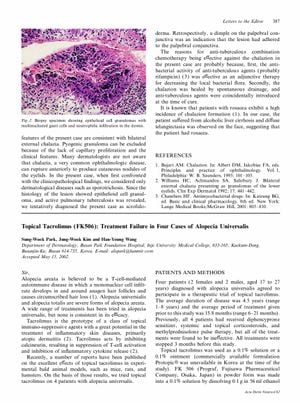Topical Tacrolimus (FK506): Treatment Failure in Four Cases of Alopecia Universalis
September 2002
in “
Acta dermato-venereologica
”

TLDR Topical tacrolimus did not regrow hair in alopecia universalis patients.
In a study involving 4 patients (2 females and 2 males, aged 17 to 27) with alopecia universalis, topical tacrolimus (0.1% solution or ointment) was applied twice daily for 12 weeks. Despite previous reports of success in animal models, no hair regrowth was observed in any of the patients during the treatment period or the 6-month follow-up. Adverse effects such as itching, scaling, and hyperpigmentation were noted but were not severe. The study concluded that topical tacrolimus was ineffective for treating alopecia universalis, possibly due to insufficient skin penetration, inadequate treatment duration, or the severity of the disease.




